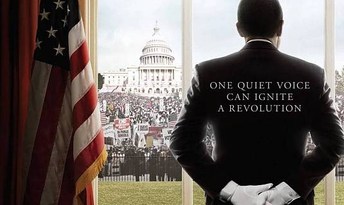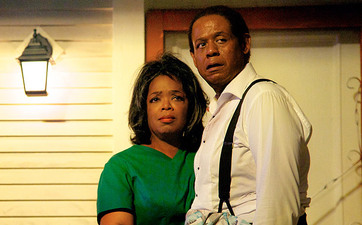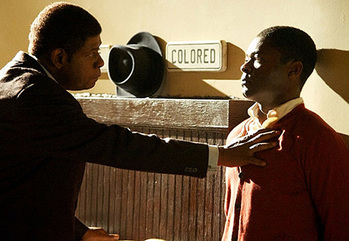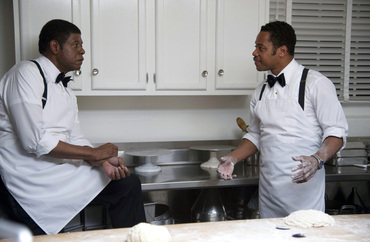
The progression of the civil rights movement has been a great source of stories for both film and literiture.Whether the story involves the fighters, those who suffer or those who segregate its an important section of history that audience love looking back over. In the new Lee Daniels film, The Butler, Forest Whitaker and Oprah Winfrey lead an ensemble cast in a story of one mans quiet influence on historical events.

Lee Daniel’s in most noted as the director of Precious, which earned him international acclaim. He followed this with, The Paperboy, another film that depicts the dark side of America. The Butler is very loosely based on the life of Eugene Allen, an African-American who served at The White House for over thirty years during the civil rights movement. Daniels is noted for dealing with hard hitting issues in his work such as race, abuse as well politics. Here Daniel’s depicts the progression of the civil rights movement through the eyes of Cecil and his family.
The film asks very interesting questions on the fight for equality. Its shows two routes of the fight that often resent one another. Cecil lost his family to racial violence and so hopes to protect his own family from such a fate through hard work. He won’t forcefully fight the prejudices he faces as long as he can protect and provide for his family. His son Louis wants to fight the inequality he faces through any means necessary and resents his father for working for ‘white folk’. The film asks if one side of the fight is better or indeed more necessary than the other. In a segment that features Martin Luther King he states, that domestics play an important part in black history. They break down racial stereotypes and present a good work ethic to those they would not usually be able to socialise with. Its a new approach that gives the film real weight.

Forest Whitaker is first off a fine actor. Able to switch his dominating presence from erratic and powerful in films such as The Last King of Scotland, to warm and sensitive in his portrayal of Cecil Gaines. You admire Cecil for the life he creates for himself and for his friendly attitude and strong work ethic. One thing that really stands out about the character is the relationship with his family. He loves his wife deeply but his dedication to his job sometimes shields this.
He has a strained relationship with his oldest son which is a large portion of the drama in the film. Coming from his background he wants his children to have what he didn’t but this is something that children don’t always fully comprehend or appreciate.
The relationships are realistic ones that are handled with care. Whitaker portrays Cecil with real charisma and heart which is the centre of the film. He is also a character that constantly develops. Even towards the end of the film the character will still grow and have changes of heart that drive the film forward.
Oprah Winfrey is a strange actress. Shes so known for her talk show and her percieved persona that it can be hard to separate her from her portrayals. Winfrey has in the past overcome this, no more so than in The Color Purple, which won her the Academy Award. Here she shines as Cecils wife Gloria Gaines. She's the matriarchal head of the family but also at times deeply troubled with alcohol addiction which she portrays realistically in the film.

One criticism of the film that is becoming all to familiar of Hollywood is the claim that it is ‘based on true events’. Very rarely is a feature film based on true events as it will inevitable embellish and exaggerate for dramas sake. Now, if it were to state the its inspired by true events, this is more accurate. The film is based on the life of Eugene Allen who worked at The White House as a butler for over 30 years. The addition of his plantation childhood and his two sons services in the war and political activism is sheer story telling. Claiming to be based on true events is becoming more and more controversial in films. The fact the Daniels has added to the story is not a bad thing. He's dramatised the story for the screen which is what a writer/director does. Surely the criticisms would stop if the tag line wasn’t used so often. Its use is a marketing tool to give the film more weight which in this case the film can stand fine on its own.
A small mention has to go to Oyelowo as Cecil’s son Louis. As the film is set over such a long period of time, he begins the film as a teenager then into his thirties. His casting as grown Louis is a great choice but you can’t suspend your disbelief that he is a teenager. Casting two actors in this role, one younger would have aided the film. This doesn’t take away from Oyelowo performance and his impeccable American accent, (yes hes English) but can’t be ignored.
Another issue with the film is that it covers such a long period of time and range of characters. There are large omissions in the story such as jumping from Cecil’s beginnings as a server to his family life with his wife and two teenage sons. Characters eneter and leave frequently which at points can be problematic. Overall the film is held together by one central thing, Cecil himself. Like Forrest Gump, its Forrest that drives the story and ultimatly its Forrest that the audience follow. With The Butler Daniel’s takes a similar approach. Cecil is centre to the film and its the audiences relationship with him that ultimately overcomes its omissions and large pool of characters.
An entertaining drama with a strong cast that raises interesting questions regarding its difficult subject matter.

 RSS Feed
RSS Feed
